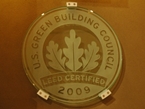Though the General Services Administration’s (GSA) sole adherence to one measure of green building certification has already faced a flurry of skepticism for the benefits and logic behind it, a government watchdog group is now closing in on the transparency angle.
This week saw the Taxpayers Protection Alliance, a watchdog for government waste, file a request under the Freedom of Information Act (FOIA) demanding GSA turn over emails exchanged with the U.S. Green Building Council (USGBC). The council, a 501© 3 nonprofit, is the originator of the Leadership in Energy and Environmental Design standards, commonly known as LEED.
Their stated purpose is “to reduce emissions, water use, waste and indoor air pollutants.” LEED standards are now the sole measure GSA requires in certifying its building projects as green.
David Williams, who heads up the Taxpayers Protection Alliance, stated that his group’s intent is “to see if there is a connection between the U.S. Green Building Council, a 501(c)3, that is benefitting financially from these new standards.”
At the core of his argument is the GSA’s adherence to a sole certification standard, despite the fact that there are three other standards in North America alone.
Williams has previously argued that this, by design, has engineered a market on green building certification standards, closing the doors to domestic providers who don’t use LEED as their certification measure.
“The U.S. Green Building Council monopoly that has been created by the GSA hurts job creation, weakens various American industries, and unnecessarily costs taxpayers hard-earned money,” he wrote in an op-ed during September of last year.
Williams’s watchdog group is not the first to call attention to potential flaws rooted in the GSA’s practice of only relying on standards engineered by the USGBC. Multiple reports from USA Today have exposed what Williams, and others, view as misuse of taxpayer dollars for the direct benefit of the USGBC, a nonprofit organization.
One study detailed that roughly 2,000 building projects across America have received tax breaks to the tune of $500 million.
A separate examination of the increased presence of LEED standards in school building projects showed that Ohio “is cutting $1.8 billion in aid to schools in 2012 and 2013 while agreeing to pay builders and designers an extra $160 million… so that 300 new schools can get certified under LEED.”
Similarly, Illinois chose to pay school districts an extra five percent to make new buildings certified under LEED, which “could exceed $250 million” in taxpayer dollars.
The Taxpayers Protection Alliance finds such practices questionable when “little effort” has been made to research “LEED’s effectiveness.”
Elected officials, too, have begun to question the practice of only recognizing LEED certification in new building projects.
Thirty-two other states join Ohio and Illinois in requiring LEED for new or reconstructive building projects. But this past year, Maine Governor Paul LePage and Georgia’s Nathan Deal issued orders barring LEED from being used in their state’s future building projects, opting instead to allow other standards to be employed.
For these two chief executives, the heart of the issue lay in the perceived waste of taxpayer dollars for standards they felt did more harm than good, with particular regard to timber certification. Less than a quarter of domestic forests in America use LEED’s preferred method of certifying timber, yet those standards remain the preferred choice of the GSA.
Such issues surrounding the continued costs of only backing the USGBC’s designed standards are at the heart of Williams’s investigation. When talking with The Daily Caller, he expressed the desire that his request would make public “what LEED is going to cost taxpayers in additional construction costs and paperwork.”
Until a sufficient level of transparency and examination to the real validity of LEED’s metrics see their day, it is unlikely that the accusations of bloated monopolization are going anywhere.
Photo credit: Wonderlane/Flickr

COMMENTS
Please let us know if you're having issues with commenting.